The weather is colder (even here in California) and most of us are spending more time indoors for warmth and entertainment. I especially like to spend time reading in bed, where I can pile on the blankets and enjoy the coziness of fall and winter. If you experience pain or discomfort—especially in your neck—when you read in bed, keep the following tips in mind:
1. Any time you are sitting or lying down can be an opportunity to decompress the vertebrae in your back. To keep the right shape in the spine, build a staircase of pillows to support your lower back, mid-back and neck
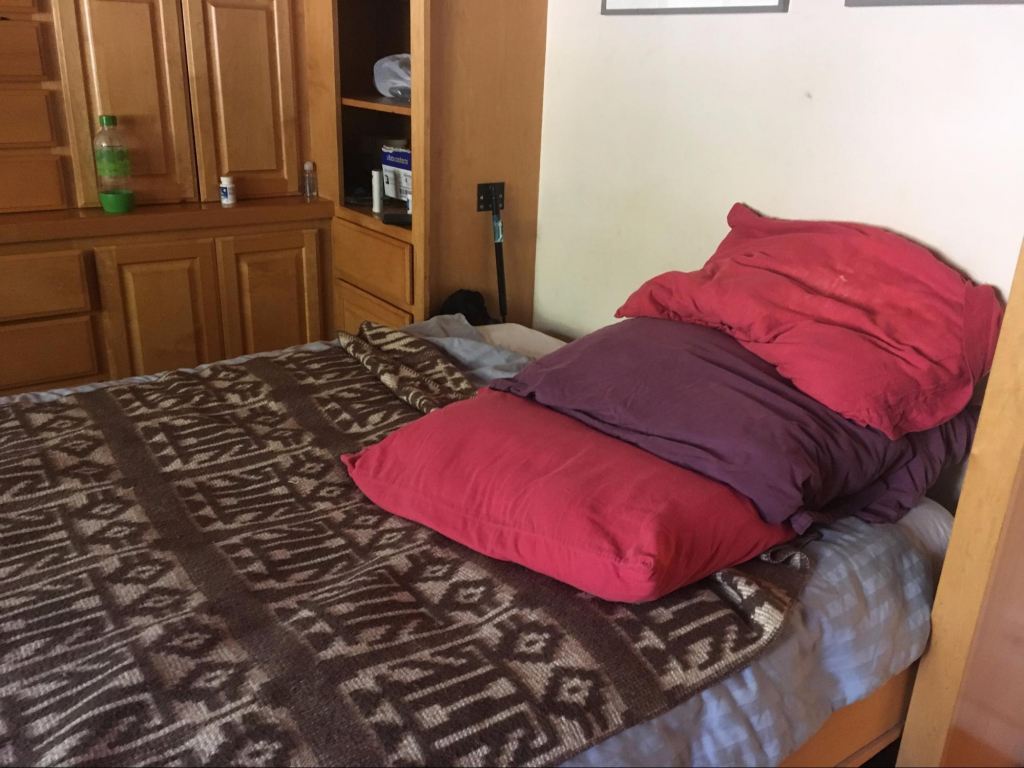
Using a combination of thick and thin pillows makes it easy to build a comfortable slope or staircase.
Lying down with just your head and neck on a plump pillow pushes your head forward relative to your torso. This is not healthy for the delicate structures in your neck; it also cultivates unhealthy forward head posture. By placing 2-3 inches of your upper back on the pillow, your head and neck align well with your upper back; this also flattens and elongates any sway you might have in your lower back.
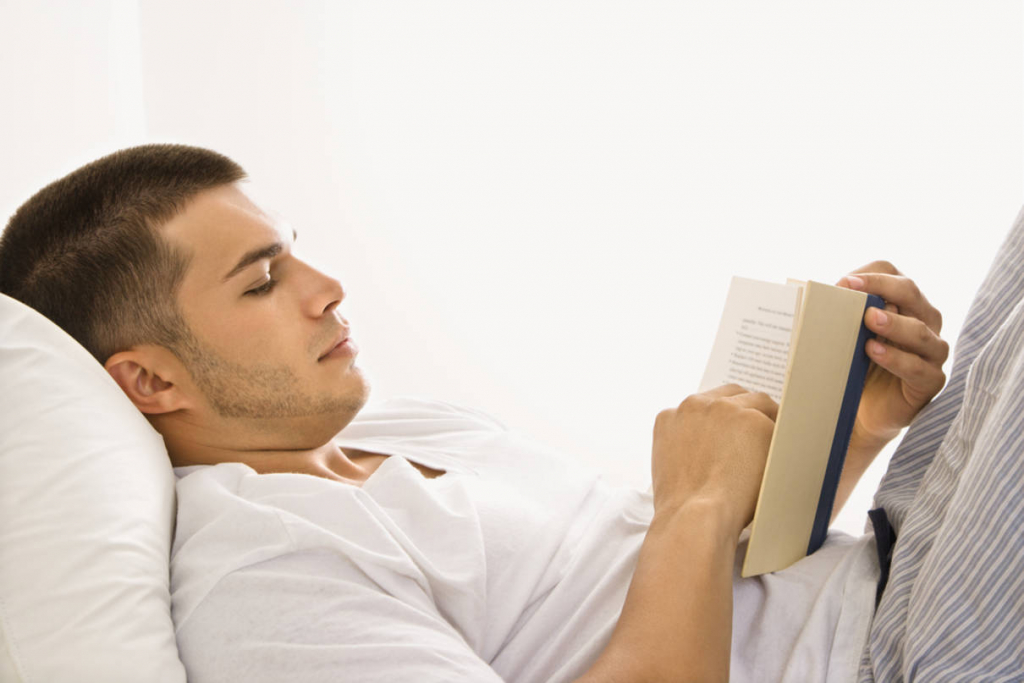
Placing a couple of inches of the upper back on your pillow helps align the head and neck with the rest of the spine; it also helps elongate and flatten some of the sway you may have in your lower back.
2. Make sure to create a little lift or ledge with a pillow at the base of your spine, above your sacrum, to create room for your behind behind you and help you maintain an anteverted (tipped forward) pelvis.
3. Don’t bend the neck excessively to get closer to your book. A straight, supported neck will prevent pinching and fatigue. Bending a small amount at C7-T1 (where the cervical and thoracic spine meet) is normal and can help match your line of vision to the book.

Tilting the head down excessively toward the book is fatiguing and compresses discs.
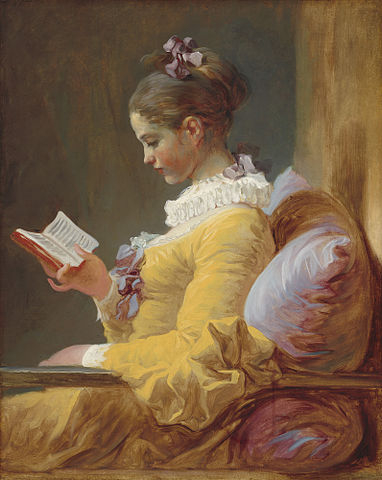
With a baseline of good neck length, an angle where the neck meets the torso can be a healthy way to read.
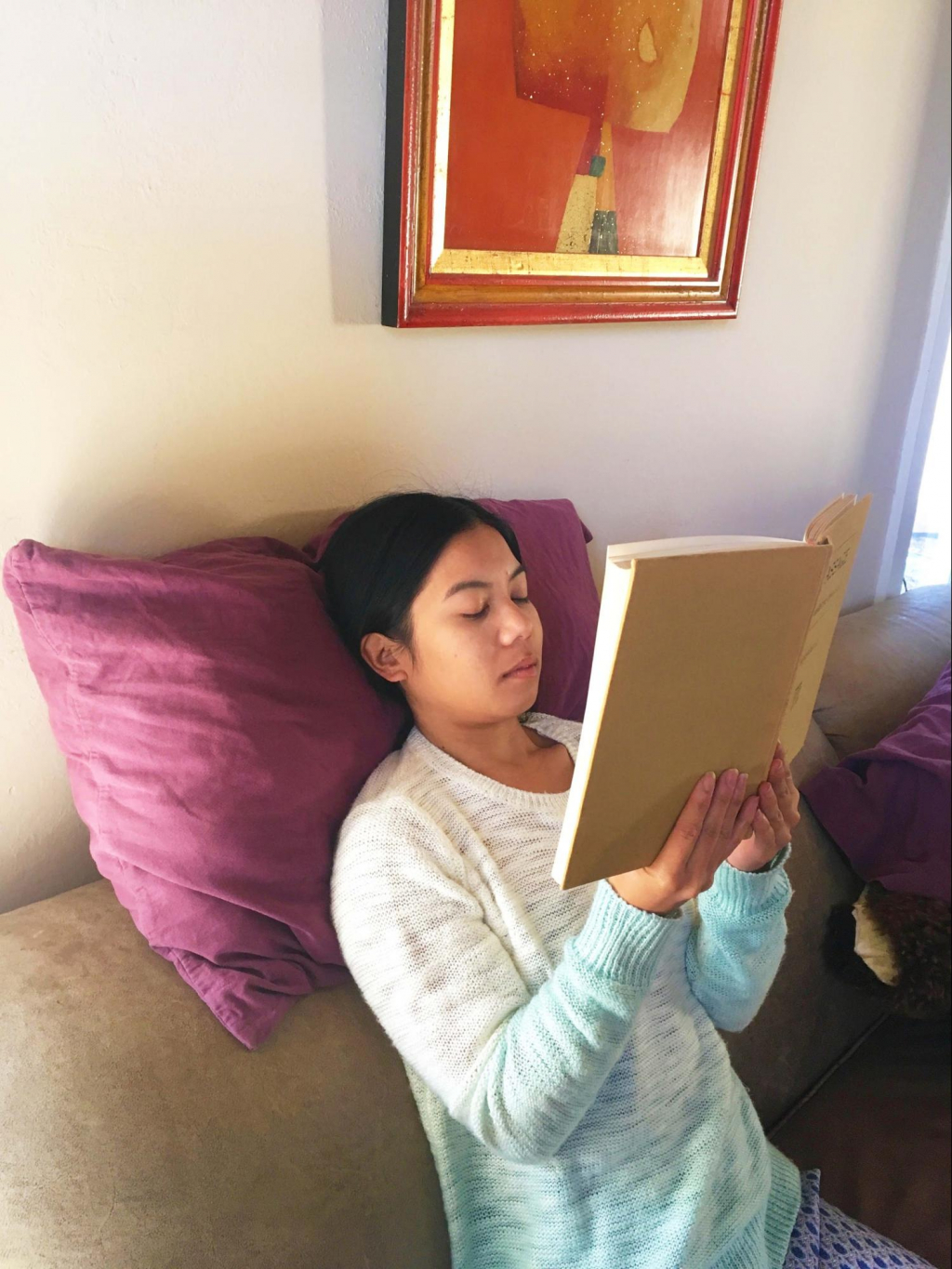
Make sure your neck has sufficient support behind it, and use the feeling of the pillow against your head and neck as a reminder to keep your head from dropping toward your book.
Sitting up against a headboard with a pillow behind you can be an excellent position, but avoid placing the book in your lap and hanging your head down to get closer to the page. This distortion could pinch a nerve or disc. Instead, try this:
4. If you are having trouble getting the right angle on your book, keep a pillow on your chest or knees to prop the book up in a visible position. This allows you to keep your spine in its optimal shape and length, and has the benefit of letting the arms relax, instead of holding the book up.
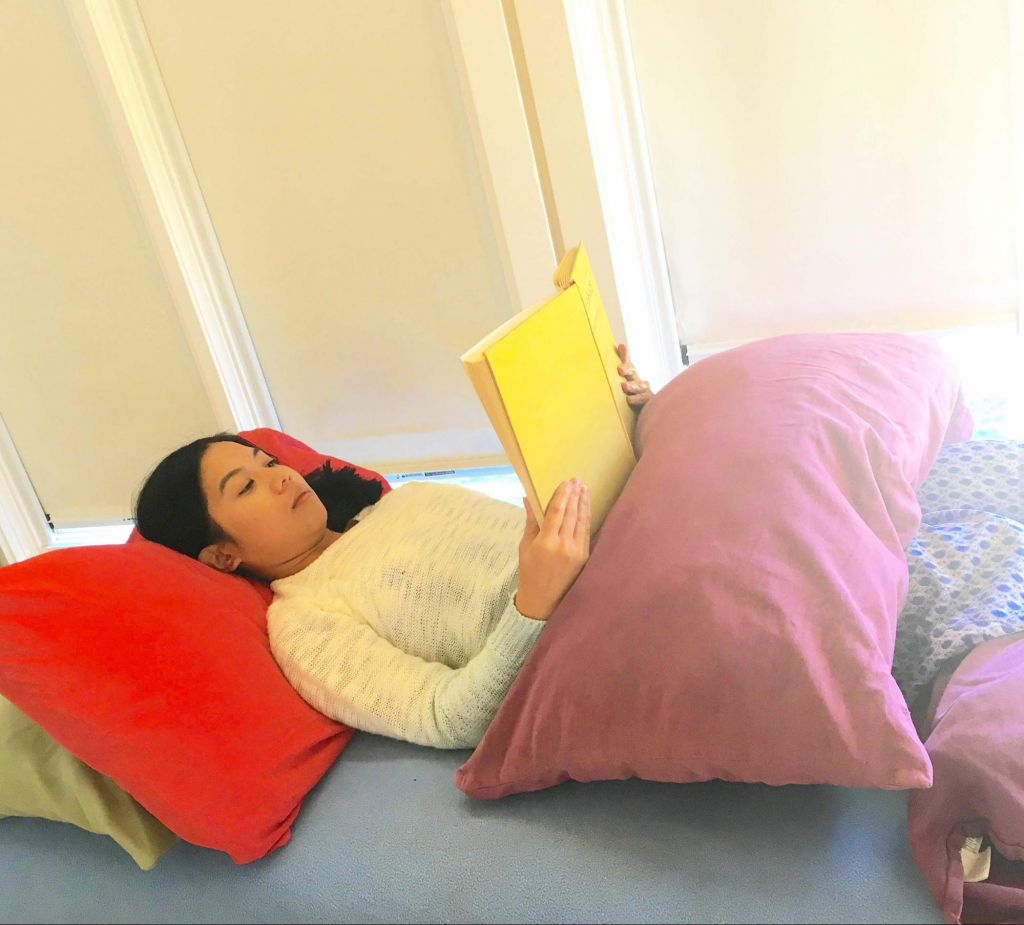
A pillow on the chest or knees, and another under the knees if you want to relax your legs more, creates a place to rest your arms and book.
5. While stretchlying on your back can provide an excellent stretch to your back, reading in this way is likely to tire your arms quickly and can lead to tendinitis in your forearm muscles.
This is an easy way to strain the delicate muscles of your wrists and forearms.
Instead, try stretchlying on your side with a big enough pillow under your head to support it horizontally, and prop the book or device against a pillow or other bolster.
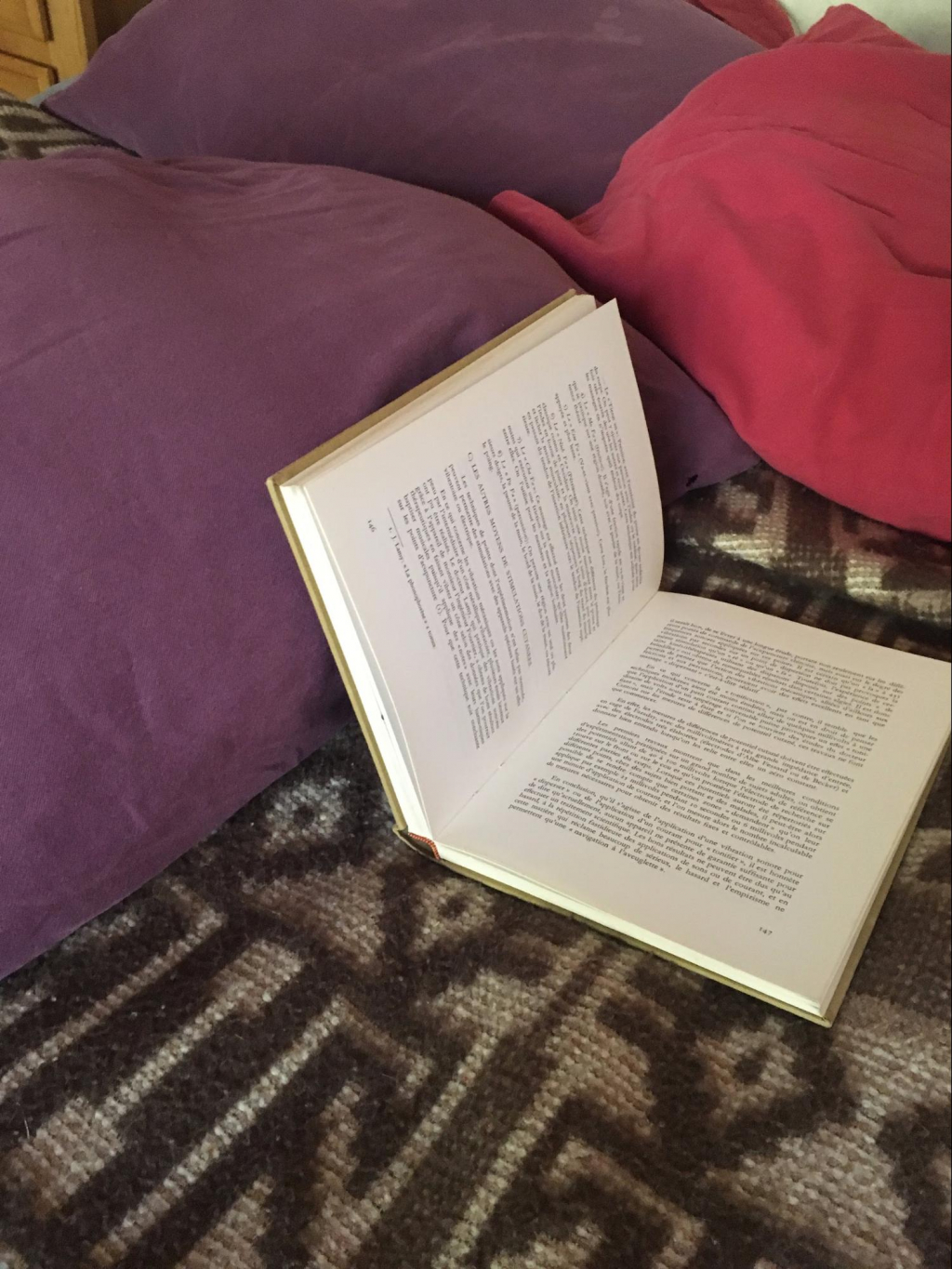
When stretchlying on the side, you can let your neck and arms relax by propping your book open against a pillow.
Do you know any other good tricks for reading comfortably? Please share in the comments below!



Comments
Very helpful. Thank you!
Very helpful. Thank you!
Esther, thank you for this
Esther, thank you for this creative and timely post. I have reduced my reading time over the years due to neck pain. Your suggestions of a bit of the shoulders on the pillow and the staircased pillows offer me new, healthy alternatives. I so appreciate you sharing your knowledge.
Thank you! It was never quite
Thank you! It was never quite clear to me why I should put the pillow under my shoulders, but now it makes sense. Hope I can reduce my recent neck pain (my psoas is too tight on the right side and this brings my posture somewhat off).
Thanks for this informative
Thanks for this informative post. Would be helpful to see a photo or graphic of this "Make sure to create a little lift or ledge with a pillow at the base of your spine, above your sacrum, to create room for your behind behind you and help you maintain an anteverted (tipped forward) pelvis." I'm trying to visualize how to do this correctly. Thank You!
There isn't a precise way
There isn't a precise way this needs to be done. It's just that your behind needs a little space to go behind you. The large triangular pillows marketed for the purpose of reading in bed do not provide this space and, rather, cause your pelvis to tuck. Use your stack of pillows to approximate the shape of a chair that does provide space for your behind - our chair is one of many examples of this as is the chair below:
I used to use bull clips
I used to use bull clips (large metal paper clips) to keep the book open. This provided relief for my hands and wrists. Then I found a great soft-sided book holder that keeps the book propped-up and open. (The Book Seat--sold at ACORN, Amazon, etc.). Hands-free until you turn the page. Some may not like having to slide the holder away each time you turn the page. I take my book seat on car trips, too. I use The Book Seat for my e-reader. You can also lay on your side and use it. Sometimes you have to put another pillow behind it for extra support or correct reading distance. When working, I needed to reference large binders while typing on a computer and used recipe book holders to fit them in and keep them upright so I didn't bend my neck or slouch over to see the page. I kept one at work and one at home. This idea is like the old document holders for typists, but holds larger documents.
I recently got an adjustable
I recently got an adjustable lap desk for reading, and it is a huge help! It lifts the book off my lap and supports the book so I don't have to. Works for books, magazines, ereaders, etc.
Simple information that has
Simple information that has tremedous help. Thank you.
As a kid I figured out the
As a kid I figured out the ultimate in energy saving reading - lie down under an acrylic or glass table, put the book on top...